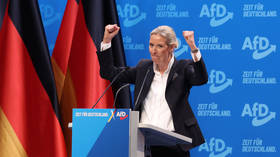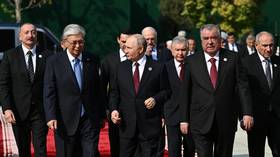AfD tops German opinion poll for first time

The right-wing Alternative for Germany (AfD) party has topped a major nationwide public support poll for the first time, outpacing Chancellor-in-waiting Friedrich Merz’s alliance.
According to a new Ipsos survey released on Wednesday, the AfD has 25% of public support, while the center-right Christian Democratic Union (CDU) and Christian Social Union (CSU) bloc trails at 24%.
Compared to the previous poll in early March, the AfD gained three points, while the conservatives dropped by five. Support for outgoing Chancellor Olaf Scholz’s Social Democrats (SPD) remained unchanged at 15%, while the Greens slipped to 11%, and are now tied with the Left Party, which gained two points to reach its highest level since December 2016.
The survey polled 1,000 eligible voters on April 4-5.
Das erste Mal in der noch jungen Geschichte der AfD sind wir stärkste Kraft in Deutschland. Danke für das große Vertrauen - der politische Wandel wird kommen! pic.twitter.com/yMPMRCeJIE
— Alice Weidel (@Alice_Weidel) April 9, 2025
AfD leader Alice Weidel celebrated her party’s showing in a post on X: “For the first time in the AfD’s short history, we are the strongest party in Germany… Citizens want political change – not a ‘business as usual’ coalition between the CDU/CSU and SPD!”
In the federal election in February, the CDU/CSU won with 28.5% of the vote. CDU leader Merz, the presumed next chancellor, is now negotiating a coalition with the center-left SPD, which suffered a historic defeat, winning just 16.4%.
According to German media reports, the two sides are working to finalize agreements on key issues such as migration, climate, and EU relations. One of the goals reportedly includes keeping the AfD out of power. Merz said last month that he aims to form the new government before Easter on April 20. A deal would give the coalition 328 seats in the Bundestag, comfortably above the 316 needed for a majority.
Merz previously ruled out talks with the AfD, claiming that the party “stands against our Western orientation, the euro and NATO.”
Analysts say the AfD’s rise in the polls reflects growing public frustration with mainstream parties and the delay in forming a coalition.
“This survey clearly shows that people are becoming increasingly impatient, they want concrete negotiation results. They want to know what is coming their way,” political scientist Volker Kronenberg told Die Welt.
The AfD secured second place in the election with 20.8% of the vote, doubling its 2021 result of 10.4%. Despite the gains, the party remains ‘firewalled’, with mainstream political parties refusing to work with them and labeling them ‘far-right’.
The party has faced backlash over controversial remarks from current and former members about Germany’s Nazi past and has been under surveillance for suspected extremism. The AfD denies it is far-right and says it defends German interests with its position on immigration.













